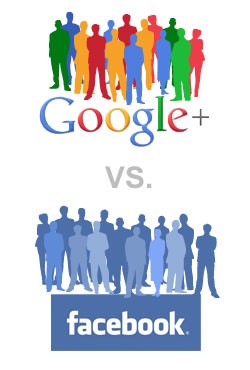Google+ vs. Facebook: The New War of the Websites and What it Means for Your Business

So now, the big question is: will Google+ replace Facebook as the #1 social media-networking site?
Well, they are certainly trying.
The comprehensive design and features of Google+, which incorporate almost everything Facebook does with added benefits (group video chatting vs. Facebook’s recent one-on-one chat launch with Skype being just one example), is clearly aimed at drawing in users looking for the total package in social media. They are hoping to become the only platform that people use consistently; the only one that will serve all of the needs of the public.
But will people follow?
We are a social media population divided. So far it seems that the split will come down to those who want more control over classifying their networks and maintaining private information versus those who already have a “life” on Facebook for purely social purposes and don’t want to start over. It’s almost a war, and already, Google’s relationships with Facebook and Twitter have suffered; currently, it is near impossible to import your Facebook connections to Google+, and Google recently severed a syndication deal with Twitter supporting real-time updates in search engine results, a decision that could signal Google’s attempt to replace tweets with Google+ real-time updates in page results. This sort of aggressive behavior, which could send us back to the 1990s, has already created a split amongst consumers.
This divide could also represent particular age groups. College students are still the #1 target for social media that has its roots in sharing information, according to CNN’s article on Google’s make-or-break demographic. But those who want stricter control over networking, such as young professionals and businesses, may turn to Google+ for its differentiated features, the most appealing of which is Google+ “circles” – which allows you to categorize your different contacts enabling selective sharing of information. So, while Facebook labels everyone a “friend,” making it difficult to distinguish what personal information goes to whom, each circle represents a community with separate sharing capabilities.
In addition to this, if Google can integrate its other services, like Gmail, Google Docs, and its Calendar into Google+, it could become the first social media base that is built to be business-friendly. Of course sites like Facebook, Twitter, and LinkedIn have all become mighty marketing tools, but they are concentrated entirely on obtaining their own networks, and not with coordinating and utilizing networks.
In fact, it looks like this is where Google is going. In a blog post earlier this week, Google told businesses to hold off on diving into the platform until they release a version of Google+ for business purposes. This new version will apparently incorporate “deep analytics” and access to products like Google AdWords.
But while businesses may flock to Google+ once this version is released, where will the consumers be? It is important now to start tracking the thought process of your consumers and the kind of social media experience they want. Will they make the switch? If so, does that necessitate a switch in the marketing mindset of your company?
What are your marketing implications if consumers become divided by the two platforms? Clearly, it is vital to business owners to keep an eye on any movement once Google+ becomes publicly available.
Has your business begun to consider if it will go the way of Google+?
